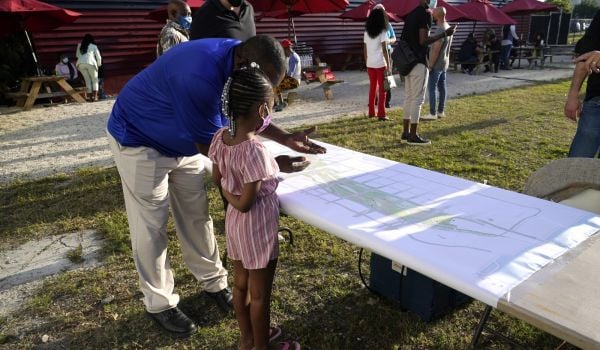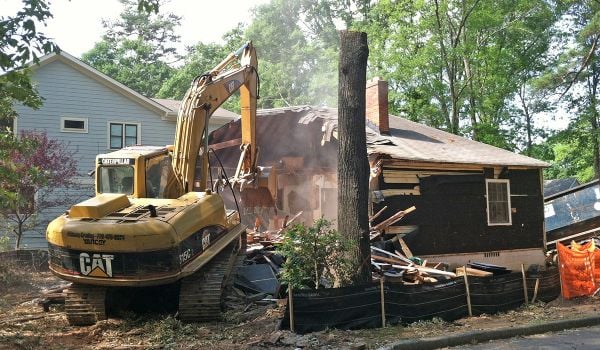Tuesday yielded a rare victory for Miami residents of modest means over the ongoing invasion of high-end real estate investors, many powered by foreign capital (some of which is tied to international crime).
Around 12:30 p.m. that day, a first-time homebuyer closed on her new house in Miami’s Little Haiti neighborhood. With a sale price of $200,000, the two-bedroom, 1 1/2 bath, single-story house is just west of luxury shopping in Miami’s Design District, and north of the trendy Wynwood neighborhood. The buyer is a single woman, 31, born in Haiti, who’s currently earning less than $40,000 a year.
Built in 1950, the home was previously acquired and then rehabbed by the Haitian American Community Development Corporation (HACDC), which also assisted the buyer in cobbling together $211,000 in financing from four different places to cover sale and closing costs: a conventional bank, the city and two county sources, including the Miami-Dade Economic Advocacy Trust.
“This layered financing is what makes homeownership affordable in the current environment,” says Samuel Diller, executive director of HACDC. Loans from public sources in particular are often interest free or have some kind of deferred payment scheme, or may just be a grant. Bottom line, Tuesday’s first-time homebuyer will be making monthly payments of $750, according to HACDC — about a quarter of her monthly gross pay. (The federal standard for affordability is that households should spend no more than 30 percent of their income on housing.)
Increasingly locals like her are struggling to buy in a Miami-area real estate market that seduces some of the world’s wealthiest investors.
“Miami-Dade County is really the only metropolitan area in the U.S. that’s in a subtropical climate. It has proximity to Latin America, Africa and Europe. It’s a unique market and so there’s capital coming in from all these places,” Diller says.
Some of that capital may be coming from the world’s worst characters.
Citing concerns about illicit money flowing into luxury real estate markets, the Treasury Department announced this week that it would begin identifying and tracking so-called secret buyers of high-end properties in Manhattan and Miami-Dade County.
“High-end real estate investments are one of the most preferred methods for laundering the proceeds of crime, corruption and tax evasion,” Clark Gascoigne tells me via email. Gascoigne is interim director of the Financial Accountability and Corporate Transparency (FACT) Coalition, a D.C.-based group of over 100 civil society organizations that advocates for policies to combat the facilitation of money laundering and other criminal activity by the financial system.
A big reason for that preference, Gascoigne explains, is an exemption for the real estate industry from a Patriot Act requirement to conduct due diligence checks on their customers and then report any suspicious activity to the U.S. Treasury. It was supposed to be a temporary exemption, granted in 2002 after some furious lobbying. It remains in place today.
“The lack of scrutiny around real estate purchases has driven up demand for high-end real estate in places like New York, Miami and Los Angeles, which naturally raises the prices of real estate for everyone else,” Gascoigne says.
Everyone else includes those on HACDC’s waiting list of 35 low- or moderate-income families whom they consider mortgage-ready. The list has been longer in the past. It may get longer yet, as more families come through HACDC’s programs.
Stakeholders in Miami’s Haitian-American community founded HACDC as the Little Haiti Housing Association in 1987. Nearly all board and staff are Haitian-American. (Diller, who moved to Little Haiti 20 years ago to volunteer with HACDC, is one of the few exceptions.) Over 2,500 people have graduated from their homebuyer education program, which is presented primarily in Creole. Diller estimates about 10 percent of alumni become first-time homeowners within a year after graduation.
So far, HACDC has directly assisted over 300 first-time homeowners around the Miami area to secure $23 million in subsidized financing out of $45 million in total financing. From 2011 to 2015, they acquired 41 properties, building and selling 23 homes to low- and moderate-income buyers.
They officially changed their name in 2012, long after becoming much more than a housing organization.
“We recognized a long time ago that we have to be comprehensive, have a multifaceted approach to community development. It’s a three-cylinder car: economic development, housing and civic/social engagement,” Diller says. “People have to be educated that they have a voice and if they organize they can facilitate and accelerate some of the economic programs and housing programs.”
They created the Northeast Second Avenue Partnership (NE2P), in 2008, in order to marshal financial, social and political resources from the community and from outside to create and sustain a “Downtown Little Haiti” commercial area. It’s now mostly autonomous from HACDC, with much of its funds coming from community development block grant contracts from the city of Miami.
The hardest part of the work, or at least the part that his staff spend the most time on, Diller says, is clearing the waiting list. Even with a bank letter in hand authorizing a total offer figure of, say, $150,000, that amount is contingent on accessing those other subsidized or unsubsidized financing sources, which slows transactions down. A family’s real estate agent might find a house for them, make an offer for $150,000, then the listing agent on the other line says, “great, how long will it take to close,” and the family’s agent says it’s going to take about 90 days because of all the layering.
“At which point, the listing agent practically hangs up on them, because cash rules,” Diller says. “You’ve got all these cash investors going around, buying up homes for $150,000, slapping some paint on there, maybe planting a palm tree and re-selling it for $180,000. Probably to another cash investor.”
Those seeking to hide illicit cash in real estate have a dual incentive to push prices ever higher, according to Gascoigne. “Beyond simply making money when their real estate investments rise in value, the more expensive a property costs, the more money they can launder in a single transaction,” he says.
In order to mitigate the effects of even more real estate investors coming into Little Haiti and other communities around Miami, HACDC is putting resources behind generating relevant data and policy recommendations for communities to discuss and rally behind. In December, HACDC released a needs assessment analyzing the Little Haiti housing market, which found that homeownership is already unattainable for most Little Haiti residents.
The assessment is quite detailed, drilling down to census tract for median income, education levels and homeownership affordability gaps, among others. Most importantly, it contains a cadre of policy recommendations that might help mitigate the expected effects of more capital flooding into the Little Haiti residential property market. Diller highlights establishing a community land trust, adoption of an inclusionary zoning ordinance and re-zoning for denser development as some of the most promising recommendations.
Meanwhile, the FACT Coalition will continue pushing to expand transparency requirements for real estate and finance.
“Corrupt foreign officials and drug lords may now think twice about buying real estate with anonymous companies in Miami and Manhattan,” Gascoigne says. “But now think of San Francisco, Beverly Hills or even just across the East River from Manhattan in Brooklyn.”
The Equity Factor is made possible with the support of the Surdna Foundation.

Oscar is Next City's senior economic justice correspondent. He previously served as Next City’s editor from 2018-2019, and was a Next City Equitable Cities Fellow from 2015-2016. Since 2011, Oscar has covered community development finance, community banking, impact investing, economic development, housing and more for media outlets such as Shelterforce, B Magazine, Impact Alpha and Fast Company.
Follow Oscar .(JavaScript must be enabled to view this email address)

















